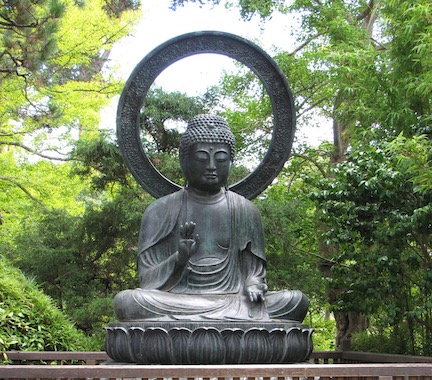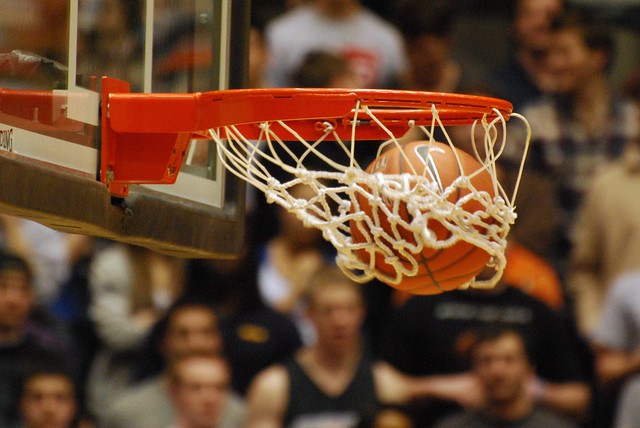On my tenth birthday my father gave me a basketball and a lecture: “Don’t play too much basketball,” he solemnly warned me, “you can’t earn a living playing a game.” The holes the sizes of silver dollars in the toes of my low black converse sneakers several weeks later were a testament to how seriously I responded to what he said.
Basketball was my first love. It’s what I worshipped; what I was whole-heartedly devoted to. I played and practiced by myself for thousands of hours; intoxicated by the rhythms of the game and the joy of teamwork. When I was 18 basketball rewarded me in an unexpected way—it was my first ‘Zen’ meditation teacher.
The memory, several decades later, remains vivid. February 1971. Riverdale, New York. My team was playing an away league game against The Fieldston School, a team we were favored to beat. In order to remain in contention for the league title, we had to win.
It was a close, heart-throbbing, hotly contested, roller-coaster battle. When we scored a basket with ten seconds left, our one-point lead appeared bullet-proof. But with six seconds to go they scored. Suddenly we were down by one point. My teammates looked devastated, shell-shocked. I felt a great calm descend. As I called time out five seconds remained on the clock. I can still see the panic on my teammates’ faces as we huddled closely, sweat dripping, wrung out. They had given up.
I moved next to my coach and put my hand on his shoulder. I asked him to tell my teammates to stay calm and get me the ball. “Spread the floor, move without the ball and let Jeffrey take the last shot,” he said. “If Jeffrey is double-teamed,be ready for a pass from him.”
Look at a clock. Count out five seconds. It is over so quickly. I had little time to try to do whatever I was going to do. We took the ball out underneath their basket, 94 feet from our goal. The other team lined up down the court, near our basket. They were playing a “box-and-one.” That is, four of their players formed a box, guarding the specific area they were assigned, and one of them, who was 6′ 2,” shadowed me—who was 5’7″—wherever I went. A teammate rolled the ball to me near mid-court—the clock wouldn’t start until I touched the ball—approximately forty-five feet from the hoop.
I am sure there was noise in the gym, but when I scooped the ball up and dribbled up the left side of the court, the place was as quiet as a Buddhist monastery. I couldn’t hear the crowd, the squeaking of sneakers or the thumping of the basketball. I was in a cocoon of concentration—alert, focused, undistracted, fully and effortlessly in the present, with no thoughts or feelings. My mind was as quiet as it had ever been. Grand Canyon quiet. And clear. Like the open sky.
Time seemed to slow down and elongate. I floated up court with no sense of exertion. I felt no pressure, no fear. The hope of victory, the dread of losing, did not exist. My opponent didn’t faze me. There wasn’t really any opponent. Oh, there was someone guarding me, but he had no impact, because at that moment, he was like a cardboard cutout of a defender standing between me and the basket, with no real power to influence me. There was just me, the ball, and the basket. And we were one. If maintaining that state of harmony meant giving up everything I owned, I wouldn’t have hesitated.
As I approached the top of the key, my defender picked me up. I sensed it was time to shoot. I wrapped my left hand around the middle of the ball, my fingertips touching its seams, my right-hand cradling the top right hand corner the way I had practiced for thousands of solitary hours since the fifth grade until it was grooved into my soul. I squared my shoulders to the basket, bent my knees and jumped. My opponent jumped toward me. I scanned the basket like an archer measuring the target, then released the ball. My left arm was extended, right through the fingertips, straight and true. The palm of my left hand waved to the rim and then faced downward, the way Nat Holman, Clair Bee, Bill Bradley and countless coaches and players have recommended before the game went airborne and abandoned the fundamental ground from which it was born.
Just as I released the ball, the arms of my defender enveloped me and blocked my vision so that I could no longer see the rim. As my feet touched the wooden gym floor, there was a cavernous silence. I looked at the basket and saw the net raised skyward, the way it does when a high-arching shot drops cleanly through the net. I looked at the scoreboard and saw that my shot had gone in. A deafening roar broke my spell as our fans mobbed the court. The locker room was noisy but I was strangely quiet, unmoved by the dramatic win and my personal heroics. I wasn’t numb. Nor was I indifferent to winning; as a highly competitive teenaged athlete, victory was very important to me. The victory did not lose its luster because I was upset by the transience of its sweetness. No, I was unemotional about our comeback because victory paled compared to what I had experienced.
I remember standing alone in the locker room after my teammates had showered and dressed, completely motionless, replaying what I had experienced during the last five seconds of the game: the heightened attentiveness, focus, and clarity; the way time seemed to expand; the absence of thought, pressure, and fear. The ecstasy and serenity more joyous than victory or acclaim.
While my teammates were celebrating our narrow victory, I was preoccupied with the tantalizing glimpse I’d had of another dimension of being, in which there is whole-hearted, un-self-conscious engagement and intimacy in the moment.
Before the last five seconds of this game, I would have called my childhood—which was devoid of religious training or spiritual experiences—non-religious. What I experienced in the Fieldston gym became a defining moment in my life. I now knew that there was a radically different way of experiencing myself and relating to the world than I had ever been exposed to. The vice grip of ambition, competitiveness, and victory—the divinities I had worshiped—was loosened.
She plays the piano best who is not concentrating on her fingers. Zen master Yamada Roshi was fond of saying that “the practice of Zen is to forget the self in the act of uniting with something.” In that state of heightened attentiveness, un-self-consciousness, and intimacy, one responds wholeheartedly without thinking. It was now clear to me that surrendering to and flowing with life was no less important than planning and goal-directed behavior.

Sports writers and academics claim that sports provide an opportunity to build character and a laboratory to discover the best within oneself. For me, basketball was both of those things, but it was also, like Buddhism was to the Buddha, a raft to another shore.
But it wasn’t until several years later—after I had done intensive meditation practice in graduate school—that that became more apparent.
An English major at Princeton, I wanted to be a professor of literature. Reading and explicating the great works of human imagination—from Greek tragedies to Shakespeare—seemed like a good way to spend my working life. But it didn’t illuminate what happened in the last five seconds of that game. Four years of studying the humanities and social sciences—reading widely in literature and philosophy, history and religion—didn’t answer the two questions that the experience in the Fieldston gym left me with: What happened when the world as I knew it—planning and worrying, judging and fearing—momentarily dropped away? Could I experience that again and live differently?
Senior year in college I decided that if I was going to teach literature for the next several decades I should first widen my experience pool. So I volunteered the year after college in a program for troubled teens at Mt. Sinai Hospital in New York City and at a half-way house for schizophrenic young adults on Long Island. I loved this work and decided that I’d rather help people in pain than decode great books.
I went to graduate school to train to be a therapist rather than a literary critic, discovered psychoanalysis, and was immediately hooked. Psychoanalysis demonstrated that there was a hidden depth and logic to even the most stubborn suffering and that through patient, disciplined, empathic awareness, miraculous pathways could be constructed, leading us out of the prisons that held many of us captive.
At the same time I began voraciously reading the classics of Eastern and Western psychology and spirituality. Buddha and Freud, Patanjali and Krishnamurti, Trungpa and Jung, were my guides and mentors in my quest to illuminate what happened in the Fieldston gym. Existence became, for me, a question, and I became immersed in plumbing its depths and fathoming its secrets.
But it wasn’t until I participated in my first Buddhist meditation retreat in 1977 with Joseph Goldstein and Jack Kornfield that I found myself on a path that illuminated the experience I had playing basketball—and so much more.

The Gifts of the Dharma
The teachings of the Buddha gave me several priceless gifts, including a new way of looking within, which helped me see.
Worrying about a future that has never happened, replaying old hurts and wounds, cascading like a pinball from memories to fantasies to fears, the mind has a mind of its own. Even when we think we see clearly we often observe life through a distorted lens. Our attention is scattered; we are ‘somewhere else,’ absent from our own lives and asleep to ourselves and to other people.
A mirror wiped clean: the experience of meditation. Meditation, the training of moment-to-moment attention, helped me begin to watch the workings of my own mind and become more aware of its wayward flights. By teaching me to hear what I listened to, see what I looked at and taste what I ate, meditation showed me how asleep I was, how much life I had missed. Because of meditation I gained a heightened ability to be ‘here,’ to have a more whole-hearted presence and to be more receptive to the world—joining whatever I was doing in a deeper and richer way. I began to glimpse greater possibilities for awareness and clarity, freedom and compassion.
A psychiatrist once asked Zen teacher Suzuki Roshi what he thought of altered states of consciousness.
“I’m just trying to help my students hear the birds sing,” he replied. The experience of paying attention helped me experience more life. And ordinary life took on a more sacred character.
“In the prison of his days,” wrote the poet W. H. Auden, “Teach the free man how to praise.” The Buddha’s teachings offered a way of celebrating daily life—and its wondrous gifts—including its beauty and miraculousness.
Buddhist ethical teachings—attention to speech and conduct, relationships and work—gave me a more systematic and less self-centered framework to live my ethics in everyday life. To speak, relate, and work in a way that caused less harm. Meditation also fostered a deeper level of compassion—an allegiance to the human family (and its non-human, furry compatriots)—rather than simply family, friends, and colleagues.
As my meditation practice deepened my interests broadened, I became more interested in bringing meditation to the world—in my case to the work I did as a psychoanalyst. Meditation practice and the Buddha’s teachings gave me tools for living the insights I had on the basketball court—and for integrating those insights into how I worked as well as lived.
I thought back to the gift my father gave me on my tenth birthday. He was correct: I wouldn’t “earn a living playing a game.” But basketball had given me something more invaluable—it had taught me priceless lessons about living.


